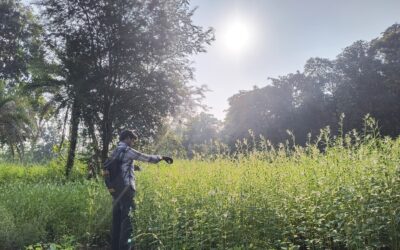“What are your names?”, I enquired of the women that crouched in front of me, plucking the weeds off the coriander farm.
“Durga”
“Lakshmi”
“Lakshmi”
“And I’m presuming your name is Saraswati?”, I quipped.
The ladies chuckled. “No, her name is Mamta, but we four are just as close as the three Goddesses”, said Durga, the more vocal of the four.
Durga, the two Lakshmis and Mamta are part of the small percentage of farm labourers residing in a peri-urban settlement called Thoor. Lying on the outskirts of Udaipur city in Rajasthan, Thoor is a picturesque village that is enwreathed by the Aravalli ranges.
According to the city dwellers of Udaipur, life in Thoor is of comfort and relaxation owing to the scenic mountains, the flowing dam (Thoor ki Paal) and clean breathable air. However, to Durga and her mates, their life, for the longest time they could recollect has stagnated to a momentum of constant expenditures. The scenic beauty adds little to their enjoyment.
Us farm labourers earn a fixed daily wage of 200 rupees after working for 9am to 5pm. I contribute to support a family of four- my husband, two kids and myself. Because of our limited wages, which have been stagnant for over four years, we have ended up living on a hand-to-mouth basis leaving me with little to no room for savings of any kind. Our expenses range from household chores to house-guests which actually takes up majority of our income. It’s funny how expensive familial relationships are!
Durga, resident of Thoor
As cherishable was Durga’s demeanor when she said this, it was laced with a longing to break from cycles and webs that they seemed to be entangled in, as she voiced, “I look for jobs everywhere, from factories to shops, but a farm labourer is all I can be”.
“It’s the toughest to manage our expenses during summers, when there’s little field work available.”, added Mamta. Diverting the conversation to a seemingly lighter note, I inquired about what they like to do for leisure.
With a fit of laughter, Durga says “Oh! But if I venture out of my house for anything other than work, my husband would beat me black and blue!”. As I stood there dumbfounded with my recently acquired knowledge of her life, the two Lakshmis chuckled in agreement. Durga quickly moved on to discussing about lighter topics like watching the soaring Hanumanji Ka Gada (mace) on their favourite T.V show and the general errands of their lives.

Moving on, she also told us about the traditions followed by the women of the village. One such tradition was of the Kartik Snaan where girls between 8-12 years old are made to bathe daily at 4am in the nearby pond for 21 chilly winter mornings of Kartik Maas (October). This is accompanied by fasting during the day. While this activity may seem absurd without context, the tradition harbours a devotion to their beloved and charming Lord Krishna in who’s service, they dedicate this month to, reflecting the many Gopis of Vrindavan. On the 21st day, a grand celebration and elaborate puja is organised by women of the village through crowd-funding amongst villagers.
In Thoor, we spent over 20 hours across a span of four days interacting with 50 villagers, out of the 2200 that the village houses. This included the Sarpanch – a woman of the Dangi caste and her husband, known as the Sarpanch-pati. While the elected Sarpanch is a woman because of the reservations in the Panchayati Raj, it is usually the Sarpanch-Pati who is at the forefront of all the development and policies implemented in the village. He claimed that gender and caste based biases were eradicated over 10 years ago, thanks to the resilient norms brought in by the preceding Panchayats.
While there exists a general sense of harmony amongst the over seven different castes residing in Thoor, subtle forms of discrimination in the façade of respect continue to persist. Whether it was pardah system that was prevalent till date, or the fact that women and the lower caste members of the community must walk barefooted at all times, as they cross the chabutara where the Panchayat is held.
A local farmer in Thoor.
He also informed us of another cultural tradition that is followed after the night Dhuleti (Holi) is burnt. In the morning, a procession of 400-500 women in the village marches to collect the remnants of the Dhuleti fire and as they walk, they hurl cuss words to anyone and everyone in the village that they come across, collecting money from them after the same. What’s notable is that nobody in the village would get offended. The fund thus pooled is used in organising festivities and food for the women and children of the village for the day.

While Thoor is an ecstatic amalgamation of many castes, cultural history and myths, it continues to strive to find its way through the light of humanism, as reflected through the voices of the different community stakeholders we came across. A faith and sense of hope within the members of the community pushes me to believe that empowerment is ongoing; that all Durgas and Lakshmis would live up to their name, raise their veils, and destroy the evil demons that hold them down. But the real question to ask is if these demons are even demonic to them? Would they continue accepting them as a part of an elaborate set-up called life? Only time will tell.








Had not heard of many of these traditional practices being followed. I like how you called it crowdfunding 🙂 If these demons are demonic to them, I wonder too, and if not, should they really be called demons?
true that!
An eye-opener.
I’m glad 🙂
true that!
I’m glad 🙂